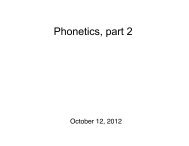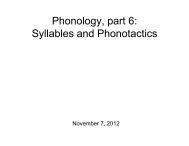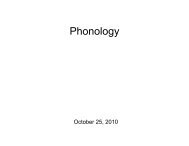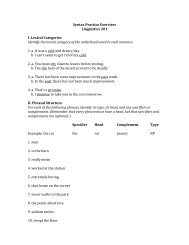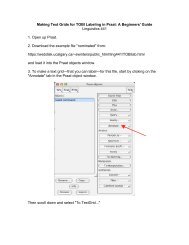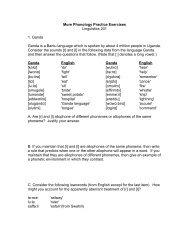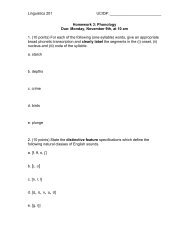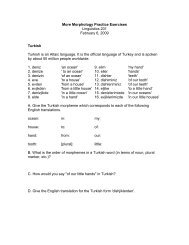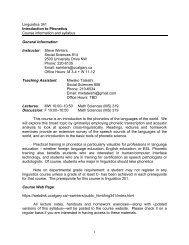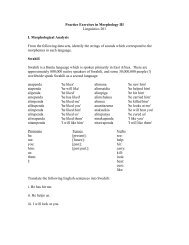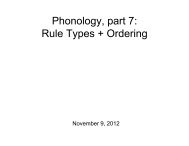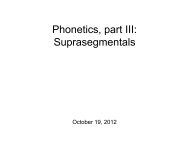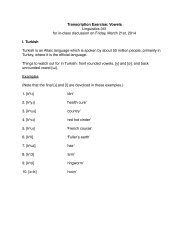Morphology, Part 2 - Basesproduced.com
Morphology, Part 2 - Basesproduced.com
Morphology, Part 2 - Basesproduced.com
Create successful ePaper yourself
Turn your PDF publications into a flip-book with our unique Google optimized e-Paper software.
<strong>Morphology</strong>, <strong>Part</strong> 2January 26, 2012
Mr. Burns Quick Write• Is it realistic to portray Mr. Burns as having a dictionaryinside his head?
Interesting Thoughts
The Last Word(s)
In Our Last Episode• Words and morphemes (meaningful “word parts”)• Word-formation rules• Free and bound morphemes• Simple and <strong>com</strong>plex words• Affixes and roots
Tree Structures• In this class, we’ll primarily stick with tree diagrams torepresent word structure.• (because they look better and are easier to read)re construct ion un desire able• Tree terminology: branches• nodes: where two branches meet• nodes represent constituents of the word
Building the Perfect Beasts• To accurately capture all of the facts of word formation…• tree structures should represent the lexical categoriesof all constituents at each node in the tree.Noun AdjVerb AdjAff Verb Aff Aff Verb Aff[re-] [construct] [-ion] [un-] [desire] [-able]
Test Case• What should the tree diagram for “reassignment” look like?Noun3. reassignmentVerb2. reassignAff Verb Aff[re-] [assign] [-ment]1. assign
Another Test Case• How about the tree diagram for “miscategorization”?Noun4. miscategorizationVerb3. miscategorizeVerbAff Noun Aff Aff[mis-] [category] [-ize] [-ation]2. categorize*miscategory1. category
Ambiguity• Some <strong>com</strong>plex words can have more than oneinterpretation• Different derivations can result in different interpretations• Example: “unlockable”Note: [un-] canattach to bothadjectives and verbs[-able] attaches toverbs and creativesadjectives
Unlockable, part 1AdjAdjAff Verb Aff[un-] [lock] [-able]• = not able to be locked
Unlockable, part 2AdjVerbAff Verb Aff[un-] [lock] [-able]• = able to be unlocked
Inflections vs. Derivations• Linguists draw another distinction among affixes:1. Inflectional affixes:• mark grammatical properties• (person, number, gender, tense, aspect)• don’t change other aspects of meaning• are required by rules of sentence structure• create a new “word form”2. Derivational affixes:• change meaning• create a new word• (typically) have clear semantic content• may change the lexical category of the word
Inflectional Affixes• There are precisely eight inflectional affixes in English:1. -s 3rd person wait --> waits2. -ing progressive wait --> waiting3. -ed past tense wait --> waited4. -en past participle eat --> eaten5. -s plural card --> cards6. -’s possessive dad --> dad’s7. -er <strong>com</strong>parative tall --> taller8. -est superlative weak --> weakest• All of these are suffixes.
Inflectional Affixes• Other languages can have a lot more inflectional affixes.• Examples from French: parler “to speak”• 1st person, plural: parlons “We speak”• 2nd person, plural: parlez “You guys speak”• Past tense:• 1st person, singular: parlais “I spoke”• 1st person, plural: parlions “We spoke”• 2nd person, plural: parliez “You guys spoke”• Plus many, many more.• Note: Volapük. (http://www.visi.<strong>com</strong>/~dean/volverb.html)
Derivational Affixes• In contrast to inflectional affixes, derivational affixes:• Create new words when they’re attached to roots• Examples:• re-• de-• -y• -izecycle --> recyclecode --> decodefish --> fishyvandal --> vandalize• Also: English has far more derivational affixes thaninflectional affixes.• For fairness’ sake: http://www.visi.<strong>com</strong>/~dean/volword.html
Picky, Picky (last time)• Inflectional affixes are always going to attach to a rootwith a particular part of speech.• Plural noun = singular noun + “s”• birds = bird + sdogs = dog + s• Past tense verb = present tense verb + “ed”• waited = wait + edtalked = talk + ed• Comparative adjective = adjective + “er”• taller = tall + ershorter = short + er• Q: if both a derivational and an inflectional affix attach toa root, which will attach first?
The Relationship• A: Derivational affixes will always attach beforeinflectional affixes do.• Remember: derivational affixes create new words;• Inflectional affixes just create new word forms.• Examples: blackened, governments, *neighborshoodVerb NounVerb NounAdj DAff. IAff. Verb DAff. IAff.black -en -ed govern -ment -s
lemmaA Note on Word Forms• Morphologists use the term lexeme to refer to a group ofrelated word forms.• wait, waits, waited, waiting, etc.• The canonical form of the lexeme is called the lemma.wordforms• = the “headword” in a dictionary.• Inflectional affixes relate a lexeme to its various forms.• Derivational affixes relate one lexeme to anotherlexeme.differentlexeme
The Class System• In English, there are two types of derivational affixes:1. Class 1 (or Level 1)• Often cause phonological (sound) changes in theroot• Also cause more profound semantic (meaning)changes to the root• Can <strong>com</strong>bine with bound roots, too.• Ex: -ity, -y, -ion• For instance:• Electric → electricity; stupid → stupidity• democrat → democracy; nation
• Class 2 (or Level 2)The Class System• Don’t cause phonological (sound) changes in root.• Less of a semantic (meaning) effect, too.• Ex: -ness, -less, -er, -ish• Normally, Class 1 affixes attach to the root before Class2 affixes.• relational -ion (1), -al (1)• divisiveness -ive (1), -ness (2)• *fearlessity -less (2), -ity (1)• fearlessness -less (2), -ness (2)
Productivity• Productivity = the extent to which a word-formation rulecan be applied to new morphemes, to form new words• Class 2 affixes tend to be more productive than Class 1affixes.• -ness vs. -ity• both attach to: adjectives• both form: nouns• both mean: the quality of the adjectiveblindnesshappinessgoodnessstupidityvalidity<strong>com</strong>plexity
Productiveness• -ness is very productive, so it can expand its reach toother words:• stupidness, validness, <strong>com</strong>plexness• The same is not true of -ity:• *blindity, *happity, *goodity• -ness is so productive, it can also be affixed to newwords:truthy + -ness → truthinesschair + -ness → chairnessproductive + -ness → productiveness
Finiteness• Note that “finitude” is the (awkward?) alternative.• Another (formerly?) productive affix: -age• wordage, sleepage, etc.
Unproductivity• -able is another very productive morpheme:• make-fun-of-able• Other morphemes are not so lucky:• -th: warm + -th = warmthwide + -th = widthdeep + -th = depthcool + -th = *coolth• -en: moist + -en = moistenred + -en = reddencute + -en = ?cutenabstract + -en =*abstracten
An Intermediate Case• -ify attached to adjectives to form verbs• just + -ify = justifypure + -ify = purify• quick + -ify = ?quickifysmart + -ify = ?smartify• An anecdotal casebusy + -ify = busifyugly + -ify = uglify• -ify has limited productivity
Blocking• Productivity can sometimes be limited by the existence ofother words• intelligent + -ness =• “intelligence” gets in the way*intelligentness• it blocks intelligentness from existence• true + -ness = *trueness (truth)• inhabit + -er= *inhabiter (inhabitant)• guide + -er = *guider (guide)• In other cases, a new word gets created anyway:• pride + -ful = prideful (proud)
Content and Function Words• One last distinction: there are both content andfunction words.• Content words =• have some semantic content (meaning)• nouns, verbs, adjectives, adverbs• ex: politics, baseball, socks, green, create• Function words =• specify grammatical relations• have little or no semantic content• prepositions, pronouns, conjunctions
Content and Function Words• Content words are an “open class”--• we can add new members anytime we want.• Function words are a “closed class”--• it’s not easy (or possible?) to add new members.• When was the last time you heard a new pronoun? Ornew preposition?• (thoughts on the quick write?)• Our minds also process function words differently fromcontent words.• For instance, how many ‘F’s are in the followingpassage?…
Check This OutFINISHED FILES ARE THERESULT OF YEARS OF SCIENTIFICSTUDY COMBINED WITH THEEXPERIENCE OF YEARS.You might want to read through it again.



